Mel Bonthuys's Blog, page 2
December 4, 2017
There's a stigma surrounding mental health, but a bigger stigma about taking medication for it!
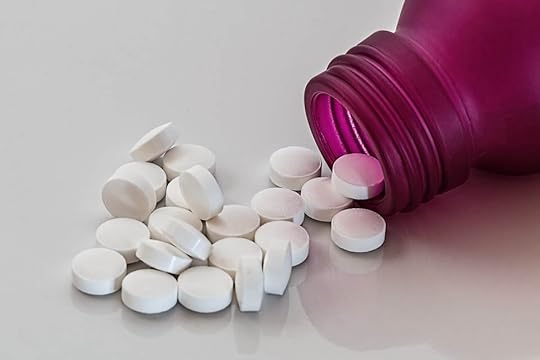 Mental health is a hot topic of late.
Mental health is a hot topic of late.More people are speaking out of their experiences with mental health issues and lending their voice to try and reduce stigma associated with having a mental illness, but while the stigma of mental illness is being tackled and hopefully being somewhat reduced, there seems to be a new stigma that is now being thrown around, and that is taking medication for mental illness!
Currently one in four people are struggling with a mental health related issue. To put it in a different perspective, a rough estimate of 450 million people worldwide are struggling with mental illness, but struggling even more so, with the concern and fear of getting labelled things such as being a ‘hypochondriac’ or being told they are weak, all because of ignorance surrounding mental health. However, the biggest label of all comes when they decide to seek help for it and that ‘help’ comes in the form of medication.
The pharmaceutical industry is a billion dollar industry. In fact, in the UK in 2016, an increase of 3.7 million more types of anti - depressants were prescribed than what they were in 2015! However, this does beg a question or two: is this a bad thing because Doctors seem to be prescribing anti - depressants like candy, or is this a good thing in the sense that more people are getting the courage to seek help for their mental illnesses?
While your family doctor may be the first point of contact for your mental health related issues, and while most of the time, they do very often prescribe medication as a quick fix, many people think that medication should be a last resort, or, if actually, even considered at all. After all, we are talking about very potent scheduled drugs with nasty side effects which in all honesty shouldn’t be used for long term treatment.
The main argument is that while medication masks the symptoms that come along with mental illness, they only treat the surface of mental illness and don’t treat the core underlying issues - in other words they don’t treat the cause of the illness, often leaving major withdrawal symptoms after dosage decrease and sometimes leading back to square one.
However, on the other side of the coin, if you have ever suffered with a mental illness, you’ll know how you’d do almost anything to have just one day when you are not accompanied by an array of debilitating physical and mental symptoms. Some people are so in the grips of mental despair that they simply don’t have the energy or the strength to search other options, and would rather take this ‘quick fix’ just to try and ease their mental pain.
I am one of those people! I completely understand what it feels like to feel so hopeless! So, I do get a bit defensive when people shout out all the time as to how drugs don’t work, and they only make you feel worse, and my personal favourite ‘medication is not the answer’
Well, I beg to differ because in my case, medication actually was the answer and if it hadn’t been for that medication, I probably would not be sitting here writing this! However, this does not mean I am pushing the ‘medication’ route for everyone, nor do I favour medication in place of natural alternatives, because when it comes to all things natural and alternative – believe me, I am in, I am on your side, and I’m the first to the party! I am simply sharing with you what I did when I was in the midst of a crippling anxiety disorder.
You also have to remember that mental health awareness and social media were not very prominent back when I was at my worst. So, I have to ask myself, with all the experience and knowledge that I have gained throughout my 17 years of being a sufferer of anxiety, would I have changed anything looking back? Yes, probably, I would have. For starters, I would have been able to see that I was not alone in my struggle by seeing all the awareness for mental health that is being created through social media. I would have had the strength to research all my options, and I probably would’ve sought help a lot sooner before my anxiety disorder got so bad that I was contemplating suicide. Would I still have opted for the conventional medication route? Honestly, I don’t know, maybe so. However, with what I know now, and with all different therapies, treatments and remedies that we have at our disposal, who knows, maybe I wouldn't have.
Natural, alternative, conventional, complementary, traditional and integrative medicine all have their place in this world, and all deserve equal recognition and consideration. Some people are swearing by things like change in diet and lifestyle, some people praise therapies like CBT or alternative therapy like hypnotism. Some people swear by rescue remedy, and some people are happy with conventional medication and have no side effects.
I myself take a complementary approach to my recovery from anxiety disorder, meaning I make use of both conventional and natural medicine. I started on a heavy dosage of conventional medication (I was a really severe case) which got me going on the road to recovery- so to speak. I then ever so slowly withdrew and withdrew, and currently, remain on a small dosage at night. To date, I have withdrawn from about 80% of my medication and have completely stopped one of my medications.
As I got stronger, I was able to help myself more – to start looking into other forms of treatment, and from a natural and holistic side of things, I changed my diet and lifestyle and started taking rescue remedy as a substitute as I withdrew from the conventional medication. I do meditations regularly, which have helped me so much, and I also swear by Rhonda Byrnes teachings which have changed my life drastically – which in turn have had a very positive effect on my anxiety and my thought patterns.
Being a person who does favour the natural way, my goal is to one day be off all conventional medication, but for now I am doing very well on my current complementary treatment program, and I see no shame in that!
I don’t believe that conventional medication is a cure for mental illness, nor do I think it should be used for long term treatment, but I do believe that sometimes, depending on the person, the right medication can act as a valuable resource in getting the person onto the road to recovery, and bullying people if they opt for this route in treatment of mental illness needs to stop!
Sometimes when a person is so deep in the clutches of mental pain and exhaustion and they simply can’t help themselves, especially if they are suicidal, medication may be the thing that might just save their life - is that such a bad thing?!
Perhaps we need to start understanding that everyone is different and it comes back to the simple thing of ‘what works for one person may not necessarily work for the next’
Treatment of mental illness, provided that it is done in a controlled and supervised manner and under the care of a professional, whatever the route taken, should never be judged or mocked, but rather a celebration of the fact that another person has decided that they want to get better and live their life free of mental illness!
References:
NHS prescribed record number of antidepressants last year
Published on December 04, 2017 09:18
September 27, 2017
What is ASMR? Here are 11 examples and why it helps anxiety
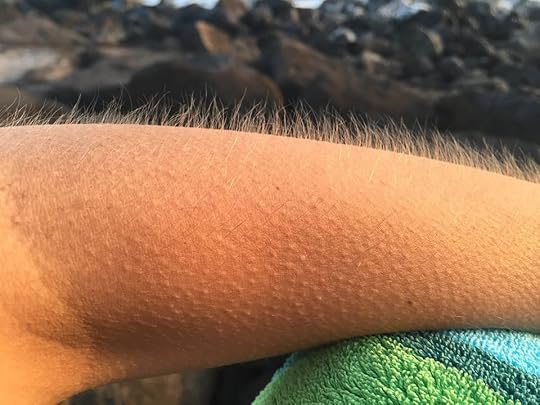 Have you ever heard someone say "Oh my gosh - that was so satisfying to watch" or better yet, have you ever experienced a warm tingle down your spine - kind of like goose bumps?
Have you ever heard someone say "Oh my gosh - that was so satisfying to watch" or better yet, have you ever experienced a warm tingle down your spine - kind of like goose bumps?If you have, then you have experienced ASMR.
ASMR stands for Autonomous Sensory Meridian Response and has been recently become quite popular.
On YouTube there are millions of videos about it, and you may have even seen people in these videos either whispering or making soft light repetitive sounds that are pleasing to the senses, such as tapping or scratching a surface.
People who experience ASMR will say that they feel a light prickly or tingling sensation on their head, back of their neck or sometimes other parts of their body. For me personally, I feel it mostly in my upper arms. The experience of ASMR brings about feelings of happiness, positivity and peace.
There are two sensations brought about by ASMR:
Physical sensations which include chills, tingles, prickles and goose bumps.
Psychological sensations which include feelings of relaxation, calmness and even sleepiness.
ASMR is unfortunately not scientifically proven as of yet, and there is not much research on it either. In fact, only one study has been done on it to date, so all we have to go on is individuals swearing by using it to help them relieve their stress and just helping them to feel happy and more euphoric in general.
Examples of ASMR: (not limited to)
- A soft voice
- Whispering
- A song
- Having your hair played with
- Water being poured into a cup
- Fingers lightly scratching a surface
- Being touched on your skin
- Watching and hearing someone play with slime
- Paper crumpling or a packet being crinkled
- Food being cooked - the sight of the food and the sounds of the cooking
- Tapping sounds
There are so many ways that an AMSR reaction could be triggered in someone, but those are a few of the more common ones.
The sad thing about ASMR is not everyone can actually feel it.
Some people have reported feeling it throughout their lives, and when first finding out about AMSR, they knew immediately what it was, they could relate to it, feeling happy that there was now a name to put to the sensations they were feeling.
If you are one of these people who hasn't felt it, don't despair - it could still happen for you.
I recommend watching one of the many ASMR videos on YouTube.
They range from people whispering, to making deliberate noises like soft cracking noises, and paper scrunching. Some people even get an ASMR response from watching recipe videos where they can hear the packets being opened and the oil frying.
My favourite ones are the slime videos - they are extremely satisfying!
Since ASMR brings about feelings of calm and happiness, it is no surprise that it would be amazing for anxiety sufferers.
ASMR has been said to help with Anxiety, Depression, Insomnia, Mood, and even improved blood flow and digestion.
It may take a while for you to find what triggers your ASMR, but once you have found it, you can use it as and when you need to.
If you enjoy meditation and find visualization easy, you could even incorporate ASMR into this practice by either listening to an ASMR sound that you like or else purely visualizing something which brings on the sensations of ASMR.
Please read through the following links for a better understanding and please watch the numerous videos available on YouTube to find your perfect ASMR triggers!
https://en.wikipedia.org/wiki/Autonomous_sensory_meridian_response
https://asmruniversity.com/about-asmr/what-is-asmr/
https://www.bustle.com/articles/164624-how-asmr-videos-help-me-cope-with-my-anxiety
Published on September 27, 2017 08:31
September 5, 2017
6 ways to get your positivity back after a bad day
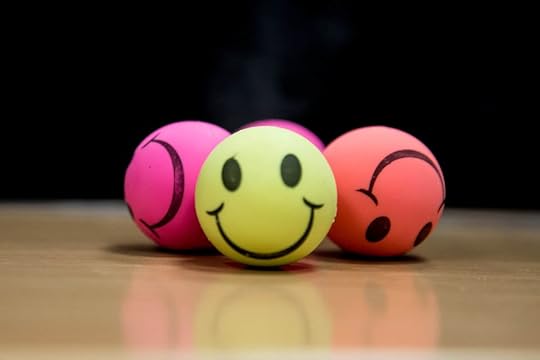 Bad Days - We all hate them, but we all have them. It's just a part of life.
Bad Days - We all hate them, but we all have them. It's just a part of life.I had one very recently, last Monday to be exact.
I felt horrible, looked horrible, and felt as though my life was heading toward a downward spiral.
Every little thing that happened that day seemed a huge catastrophe, as far as I was concerned, and going out to the shops was a nightmare for me, as my social anxiety seemed worse than ever!
That evening, I just broke down.
After I had cried, I managed to gather my composure, put my big girl panties on (so to speak) and pondered what had happened that day. I also realised that being the anxious person I am, that the days events would no doubt make me feel like that the next day, and the next and the next, and unless I, myself decided to step in and do something about it, I knew my anxiety and bad mood would be with me for quite a few days, risking an anxiety relapse.
Oh the joys of being an anxiety sufferer....
Fortunately for me, throughout and currently still while in recovery from anxiety disorder, I have managed to learn that anxiety can indeed be controlled before it gets out of hand. However the trick comes in, in finding the strength to overpower it when you are in a negative space already!
But these are all things I have learned and continue to still learn, and I want to share them with you as well. Below I have listed 6 ways that I help myself out of a negative space.
Before you try out the tips below, it is important to remember that you should always know and understand why you had a bad day. Ask your self 'Did I wake up feeling negative, or did something happen during the day that shifted my mood from positive to negative / happy to sad?
Once you have established that, then you can concentrate on getting your 'punch' back.
These following tips are the exact ones that I used to help me get back my positivity and push away anxious symptoms from purely having a bad day:
1) Force a Smile - even a fake one will do the trick!
Even if you have to fake it, just smile!
Even if you alone, just smile at the wall if you have to.
It sounds a bit strange but just give it a try, and you'll feel instantly better. This is because neurotransmitters (endorphins) are released when we smile, helping us feel calmer and happier. Bear in mind that when you are in a more relaxed state, cortisol is also greatly reduced. Cortisol is a stress hormone.
2) Watch something funny
For more or less the same reasons above, laughing at a funny show or movie will really get you into a feel good mood, and can help a lot to get rid of stress and anxiety.
3) Listen to a motivational YouTube video
YouTube is overflowing with these types of videos, and they range from 3 minutes to over an hour long. When I feel really deflated, I put one of these on, and it really does help to inspire me.
4) Meditation for believing in yourself
I highly recommend taking some time out and doing a meditation specifically aimed at helping you to believe in yourself again. 'Letting go' meditations and general stress meditations are also good, but if you feeling uninspired and have self doubt, then focus on a 'believing in yourself' or 'self doubt' meditation. If you not really into doing meditations, then I still recommend just listening to one, and paying attention to the words.
5) Think about someone who has overcome the impossible
I have two people who really inspire me and when I feel down and out, I think of these two people and why they inspire and motivate me. I think about what they have been through and how they never gave up. I can honestly say it really does help me to get back on track.
6) Leave it for a day and come back to it
Often we have our down days because we have been working too hard or pushing too hard, and it's our bodies way of telling us that we need to slow down a bit.
There is absolutely no shame in taking a day for yourself during times like this, and practising a bit of self care. You are no use to yourself or anyone else if you are in a negative frame of mind, and if anything, you'll come back feeling more refreshed and motivated than before.
References:
https://www.psychologytoday.com/blog/cutting-edge-leadership/201206/there-s-magic-in-your-smile
http://www.lifehack.org/articles/communication/7-benefits-smiling-and-laughing.html
Published on September 05, 2017 10:02
August 28, 2017
Tic Disorders - 10 examples of tics and how to handle them
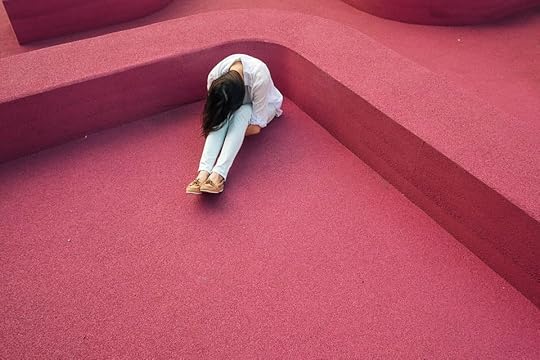 **TRIGGER WARNING** PLEASE NOTE THAT THIS ARTICLE MAY TRIGGER ANXIETY SYMPTOMS - IF YOU ARE IN AN ANXIOUS OR VULNERABLE STATE, PLEASE PROCEED WITH CAUTION OR READ IT AT ANOTHER TIME.
**TRIGGER WARNING** PLEASE NOTE THAT THIS ARTICLE MAY TRIGGER ANXIETY SYMPTOMS - IF YOU ARE IN AN ANXIOUS OR VULNERABLE STATE, PLEASE PROCEED WITH CAUTION OR READ IT AT ANOTHER TIME.Nervous tics happen to many people at some point in their lives, especially when they are small children. Usually it is temporary, and disappears as a person ages, but for some people it doesn't, and can happen throughout their lives and on a more regular basis, especially in times of stress.
Tic Disorder is described as an involuntary movement or sound that a person makes with their body or mouth.
The physical tics (with the body) are referred to as motor tics and the verbal tics (with the mouth) are known as vocal tics.
Ten examples of some nervous Tics include: (but not limited to)
- Blinking and squeezing the eyes - making it seem as though the eyes are irritated
- Shrugging and rolling the shoulders
- Shaking a leg or both legs up and down in a very fast manner
- Rocking back and forth
- Making clicking sounds with the mouth
- Repeating certain words - sometimes yelling obscene words
- Clearing the throat for no apparent reason
- Stretching the fingers across each other - especially the pinkie finger
- Wrinkling the nose
- Jerking
Tourette Syndrome is the most common type of Tic Disorder. However to receive a diagnosis of this, a person must have two or more motor tics and one vocal tic, and they need to happen regularly.
The tics must have happened for at least a year and they need to have begun before 18 years of age.
The person should also not be experiencing the tics as symptoms from taking other medication or from having another medical condition.
What causes Tic Disorder?
The cause of Tic Disorder is not really known, but a few causes are speculated:
- Genetics
- Chemical imbalance or Abnormalities in the brain
- Other Mental Disorders such as ADHD, Anxiety, OCD and Depression
Tic Disorder can differ from person to person. Some people are not even aware that they are doing the Tics - this is more so with things such as wrinkling the nose, clearing the throat or shrugging the shoulders.
Some people however are aware of their tics but struggle to fight the urge to not perform the Tic. This can leave the person with increased frustration as a result of not carrying out the tic.
How to treat Tic syndrome
Unfortunately, there is no solid cure for tic disorder, however, it can be managed in a very efficient way.
A holistic approach is the best way to manage tic disorders, so whichever method you choose, it is always a good idea to look at your diet and lifestyle.
Because stress, anxiety and fatigue are big contributors to tic disorder, a person should try to keep their stress levels low, manage their anxiety and get enough sleep. If the tics are mild, then self care may be all you need to manage the condition.
For more severe cases however, apart from medication, two main therapies can be used under the guidance of a doctor and psychologist:
Habit reversal therapy helps a person to learn other ways to respond to the tic, so that those are used instead of the Tic, preventing the Tic from happening
Exposure with response prevention exposes a person to the sensations that they feel just before the Tic happens, helping to prevent the Tic from occurring.
Muscle Twitching
It is very important to note that the muscles are heavily affected when our bodies are under stress or in an anxious state. The muscles are constantly in a state of tension, causing muscle twitching, or as was in my case, complete paralysis of the muscle from stressed induced muscles spasms.
This is because the nervous system is in an erratic state. This affects the nerve impulses, which control the muscles.
Here are some reasons at to why you may be experiencing anxiety induced muscle twitching:
The muscles are simply tired
When the muscles are in a tensed state, it's like they are doing exercise, but they never get to rest or stretch out - causing them to tire out easily, resulting in spasms, cramps and twitching.
Adrenaline
As we know, adrenaline sets off the fight or flight response, which obviously gets our bodies into an excited state. This causes the muscles to want to move, resulting in an involuntary twitch.
Lack of Magnesium
Magnesium is one of the bodies anti stress minerals and helps the muscles to relax
Not enough exercise
Exercise is important for keeping the muscles flexible and strong. Always warm up and cool down before exercise.
Not drinking enough water
People who are anxious tend to sweat or urinate more often, which could contribute to dehydration.
I encourage you to read the following references and resources, especially if you or someone you know suffer with a tic disorder:
http://www.healthline.com/health/transient-tic-disorder#symptoms3
http://www.nhs.uk/conditions/tics/Pages/Introduction.aspx
http://www.webmd.com/brain/tic-disorders-and_twitches#1
http://www.calmclinic.com/anxiety/signs/muscle-twitching
http://emedicine.medscape.com/article/1182258-clinical
https://www.cdc.gov/ncbddd/tourette/diagnosis.html
http://www.nhs.uk/Conditions/Tics/Pages/Treatment.aspx
http://www.anxietycentre.com/anxiety-symptoms/muscle-twitching.shtml
http://www.calmclinic.com/anxiety/signs/muscle-spasms
Published on August 28, 2017 03:41
August 10, 2017
7 Habits that could be making your Anxiety worse
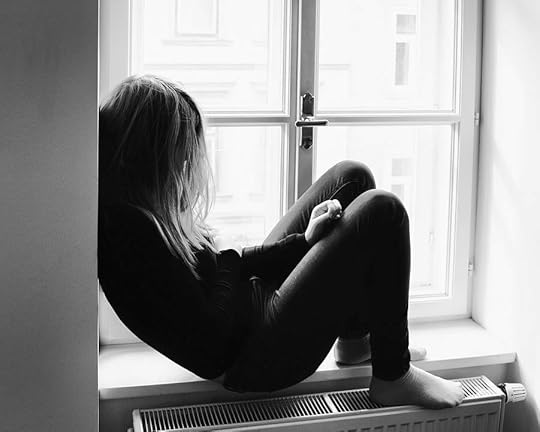 PLEASE NOTE: THE FOLLOWING BLOG WAS WRITTEN BY ME (MEL BONTHUYS) FOR CARE 2 CAUSES AND APPEARED ON THEIR SITE ON 1 AUGUST 2017
PLEASE NOTE: THE FOLLOWING BLOG WAS WRITTEN BY ME (MEL BONTHUYS) FOR CARE 2 CAUSES AND APPEARED ON THEIR SITE ON 1 AUGUST 2017
Habits are hard. The good ones are hard to get into—and the bad ones are hard to break—and as we grow up and mature and start to feel the stresses of life, we can become reliant on certain kinds of behaviours and habits to make life easier for ourselves.
Unfortunately, these behaviors could be the stepping stone to developing an anxiety disorder or make existing anxiety worse if not recognized and dealt with in a more efficient and healthy way.
Here are 7 common habits that could be making your anxiety worse:
1) The need to be perfectPerfectionism is a very common personality trait of several kinds of mental illnesses such as anxiety disorders and eating disorders. Perfectionists feel the need to get everything done on time, get it done right the first time and are extremely hard on themselves when they don’t succeed. Perfectionism can make a person believe they are not good enough unless they are perfect in everything from their physical appearance, to their careers, to their abilities as a parent or partner.
Perfectionism Tip – Start practicing positive self talk. When you feel yourself saying “I am stupid” rather force yourself to say “I made a mistake, but that’s okay.”
2) IndecisivenessI myself struggle with making decisions, and even when I do, I always find that I want to change my mind a few days down the line. Anxiety sufferers do struggle to make up their minds, and because we are so anxious all the time, we are constantly having a battle within our minds wondering which the best way to go is, and because we fear everything going wrong, it can be hard to make up our minds at all, leaving the decision up to someone else.
Decision making Tip – Draw up a pros and cons list. This has helped me in many sticky situations.
3) Taking on too muchThis is not only related to your career. You could be involved in charity work, being a parent, organising an event or travelling to different places. Taking on too much not only causes physical exhaustion—it can also cause brain fogginess and panic when it starts to feel as though there are not enough hours in the day.
Time management Tip – Invest in a diary and allow yourself some ‘me time’ in between your appointments. Also learn to say no when you have too much to do in one day.
4) Sleep habitsWithout sleep, we as humans would not survive, and an average adult human should be getting 8 hours of sleep per night. Things like stress, anger, anxiety and depression can cause insomnia, leaving you feeling awful the next morning, contributing to poor performance and even more anxiety and depression. Here are some awesome hacks and tricks for insomnia.
5) Skipping breakfastIf you are one for getting headaches, feeling bloated, tired and irritable in the morning—this could be related to you not eating breakfast. If you cannot eat in the morning, you can start off small. Try squeezing 2 oranges and drinking the juice and munching on some nuts. This is a light snack and a great combo for anxiety. I actually find this is the best to eat when I don’t feel like eating in the morning—then at about 11am, I’ll have an apple or banana which will last me until lunch time.
6) Caffeine and SugarAmong other things, caffeine speeds up the heart rate, contributes to insomnia and increased cortisol - a stress hormone. Sugar, on the other hand, upsets the blood glucose levels and depletes the body of Vitamin B, our anti-stress vitamins.
Caffeine reducing Tips - Don’t go cold turkey if trying to give up coffee. Concentrate on cutting back on your daily cup allowance. For chocolate, try eating something like a medjool date or another piece of sweet fruit before eating chocolate—most of the time, you won’t feel like the chocolate afterwards. For soda, try substituting for sparkling water with some freshly squeezed fruit juice.
7) Imbalance between your work, family and relaxation lifeI think it’s safe to say that most of us struggle with this one. Achieving a healthy balance within these things is a tough one, but there are ways to improve it. So many people take on too much in their jobs, and often family and time for themselves take a backseat, which could leave you feeling guilty, angry and tired.
Balance Tip – Invest in a diary, and schedule time for family and relaxation. It sounds funny scheduling time for family and relaxation, but it really is a smart life hack!
Published on August 10, 2017 05:37



